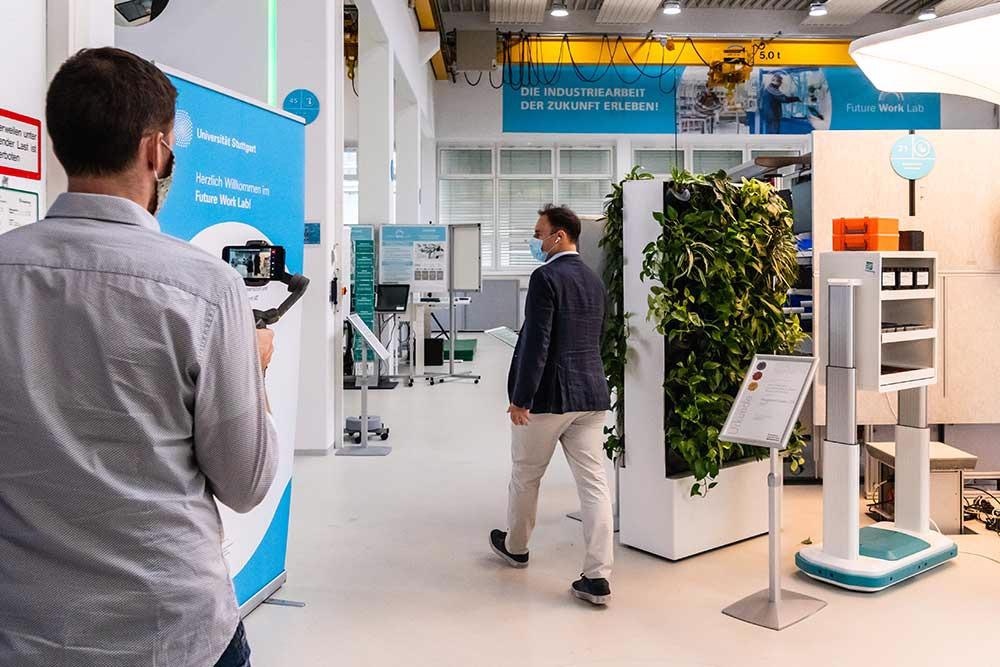Mar 8 2021
Today, a number of significant changes are being faced by the manufacturing sector, and one of the biggest ones is the advent of autonomous systems to help in the workplace.
 At the 'Open Lab Days,' experts guide the visitors through the Future Work Lab. Image Credit: Valentina Klepikova, Fraunhofer IAO.
At the 'Open Lab Days,' experts guide the visitors through the Future Work Lab. Image Credit: Valentina Klepikova, Fraunhofer IAO.
This trend will require the use of smart solution templates and data-based analytics to support the staff involved in value-creating activities.
Professionals from Fraunhofer IAO and Fraunhofer IPA will present the benefits of artificial intelligence (AI) in the manufacturing industry to an international audience. The presentations will be delivered at the International Open Lab Day.
Numerous ways are available through which AI can help make manufacturing more resilient and flexible.
These methods involve automated data capture that can be used to demonstrate where production operations can be improved; the application of AI-based AR systems to extend support to personnel working in assembly, and the launch of software for smart shift planning
As the manufacturing sector moves toward the direction of Industrie 4.0, the most crucial change in this industry is the increasing use of autonomous systems. This implies that production systems are not simply linked to their environment but they also work in an adaptive, autonomous, predictive and self-learning way.
To put this in simple terms, these production systems use all the available information to detect and examine errors and subsequently develop a suitable solution. This approach not only allows for a more sustainable application of resources but also leads to reduced emissions.
In this type of adaptive work settings, human workers are able to work more efficiently, supervise processes, and undertake control tasks that are less severe in nature.
We show that Industrie 4.0 is no longer a bold vision and that it has long since become part of everyday industrial reality. The advent of smart services, end-to-end data management and new forms of human-machine interaction has set new standards of digital performance across entire sectors of industry.
Dr Moritz Hämmerle, Project Manager for Future Work Lab, Fraunhofer IAO
Future Work Lab Showcases the Use of AI in Manufacturing
Now, at the Future Work Lab, the Fraunhofer Institute for Industrial Engineering IAO and the Fraunhofer Institute for Manufacturing Engineering and Automation IPA, both based in Stuttgart, are displaying more than 50 demonstrators from across the spectrum of upcoming working environments in the manufacturing sector.
Digital technology offers us new opportunities to design human-centered assistance systems for use in manufacturing. At the Future Work Lab, we demonstrate the potential uses of cognitive and physical assistance systems in industrial manufacturing environments.
Simon Schumacher, Project Manager for Future Work Lab, Fraunhofer IPA
On April 16th, 2021, both Fraunhofer Institute will hold an International Open Lab Day. This event will be conducted in the form of a virtual tour of the facility, thus opening it up specifically to visitors from outside Germany, for the first time.
Online participants will be guided through a live inspection of the laboratory by manufacturing experts. An array of new AI demonstrators will also be showcased.
This will include demonstrators that are already commercially available and also those that have been specifically designed for the Future Work Lab to demonstrate the tangible benefits of tailored assistance for staff working in the manufacturing sector. The following demonstrators will be included in this section:
- AR support on the assembly line—today, AR glasses with object recognition are increasingly being used to help the assembly line workforce. Keeping this aspect in mind, the object recognition software should be trained beforehand with a huge amount of high quality information. This training can be automated by using AI.
- Plug-and-play data capture and process optimization—this flexible and portable all-in-one data-capture tool integrates a modular sensor system and the application of AI-based algorithms for process recognition. It automatically identifies where manufacturing processes can be improved.
- xAI: Explainable artificial intelligence for neural networks—the increased use of AI-based systems has resulted in a rising demand for an explanation of how these AI systems actually operate and how they are able to make decisions. In such scenarios, more transparency can help boost the acceptance of AI as a tool used to support personnel in the workplace environment.
- AI-based support for smart shift planning—intelligent shift planning allows shifts to be modified at short notice. It even includes flexible time management during times of economic upswing or downturn, and offers attractive working hours to employees. AI also helps with tailored shift planning.
International Networking and Knowledge-Sharing
Established in February 2017, the Future Work Lab is Germany’s biggest facility for studying the effect of the Industrie 4.0 standard on the manufacturing sector.
Spread across an area of about 1000 m2, the Future Work Lab offers visitors a preliminary impression of upcoming working environments in the manufacturing sector. Ever since it was opened in 2017, the Future Work Lab has received over 13,000 visitors from across the world, chiefly in tandem with the Open Lab Days, which is held regularly.
The International Open Lab Day will target the major challenges that must now be confronted by manufacturing firms due to digital transformation. Hence, it is believed that the event will help build global networks and also support knowledge-sharing among like-minded individuals.